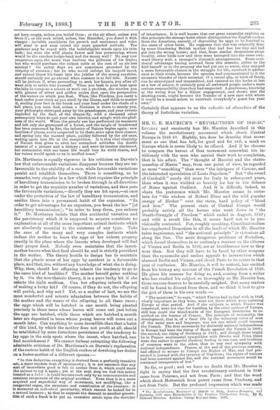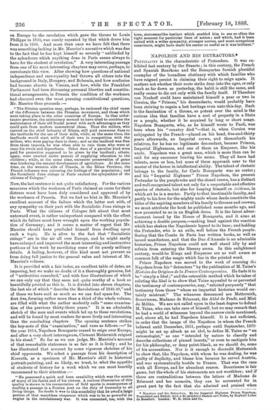MR. C. E. MAURICE'S "REVOLUTIONS OF 1848-49."
LUCIDLY and succinctly has Mr. Maurice described in this volume the revolutionary movement which shook Central Europe in 184849. Rightly, too, does he describe that move- ment as one that has left, for good and for evil, a mark on
Europe which is never likely to be effaced. And if he chooses to compare the heroes of that movement somewhat too in- vidiously with the men who carried their work to completion, that is his affair. The " thought 4 Mazzini and the states- manship of Mania " may, from one point of view, be regarded as more " ennobling " than were " the intrigues of Cavonr, and the interested speculation of Louis Napoleon." But " the sword of Garibaldi" surely did more for Italy in subsequent years, than when it was wielded so bravely for her in the defence of Rome against Oudinot. And it is difficult, indeed, to share the preference which Mr. Maurice seems to enter- tain for " the wisdom of Robert Blum and the wild popular energy of Hecker" over the stern, hard policy of "blood and iron." The present state of Central Europe would probably satisfy all the heroes who went down in " the Death-Struggle of Freedom" which ended in August, 1849 ; and with a result like this, it seems hard not to be pro- visionally contented. For, roughly speaking, Constitutionalism has supplanted Despotism in all the lands of which Mr. Maurice takes cognisance, and "the national principle" is victorious all along the line. The more dangerous problems of Socialism, which forced themselves in so untimely a manner on the citizens of Vienna and Berlin in 1848, are as troublesome now as they were then. But they will have to be faced by other weapons than the spasmodic and useless appeals to insurrection which alarmed Berlin and Vienna, and shook Paris to its centre in that year of confusion. Mr. Maurice, it will be noticed, has omitted from his history any account of the French Revolution of 1848. He gives his reasons for doing so, and, coming from a writer who has studied his subject so thoroughly as Mr. Maurice has, those reasons deserve to be carefully weighed. But many readers will be found to dissent from them, and we think it best to give the gist of them in his own words :—
" The questions," he says, " which France had to deal with in 1848, vitally important as they were, were not those which were agitating Europe at that period. And if the subjects in which France was interested, were not ripe for handling by the other nations of Europe, still less could the watchwords of the European Revelation be in- scribed on the banner of France. The principle of nationality, the development, that is, of a freer life by the voluntary union of men of the same race and language, was not one which could interest the French. The first movement for distinctly national independence in Europe had been the rising of Spain against the French in 1808; the second, the rising of Germany in 1813; and though there might be in France sentimental sympathies with Greeks and Poles, these were dae rather to special classical feeling in one case, and tradition of common wars in the other, than to any real sympathy with national independence. France, at the end of the previous century, had offered to secure to Europe the Rights of Man, and had pre- sented it instead with the tyranny of Napoleon ; the rights of nations had been asserted against her, and the national movement would be continued irrespective of her."
So far, so good ; and we have no doubt that Mr. Maurice is right in saying that the first revolutionary outburst in 1848 came from Palermo, and not from Paris ; and that the word which shook Metternich from power came from Prosburg, and not from Paris. But the profound impression which was made
* The Revolutionary Movement of 1848-49 in Italy, Austria-Hungary, and Germany, with some Examination of the Provisos Thirty-three Years. By C. Edmund Maurice. London : George Bell and Bone. 1887.
on Europe by the revolution which gave the throne to Louis Philippe in 1830, was surely repeated by that which drove him from it in 1848. And more than once we have felt that there was something lacking in Mr. Maurice's narrative which was due to the fact that he has kept himself so severely " unblinded by the splendours which anything done in Paris seems always to have for the student of revolution." A very interesting passage from one of his most interesting chapters may serve, perhaps, to corroborate this view. After showing how questions of national independence and race-equality had thrown all others into the background in Italy, Hungary, and Bohemia, and how confusion had become chaotic in Vienna, and how, while the Frankfort Parliament had been discussing personal liberties and constitu- tional arrangements, in Prussia the condition of the workmen had obscured even the most pressing constitutional questions, Mr. Maurice thus proceeds :—
" The Silesian question may, perhaps, be reckoned the chief cause of the difference between the Prussian movement, and those which were taking place in the other countries of Europe. In that unfor- tunate province, the aristocracy seemed to have tried to combine the maintenance of their old feudal power with such advantages as they could gain from modern commercial ideas. Thus the millers, who carried on the chief industry of Silesia, still paid enormous dues to the landlords for the use of their mills, while, at the same time, the landlords would start mills of their own in competition with the millers, who were paying dues to them ; and as the landlord was free from those imposts, he was often able to ruin those who were at once his rivals and dependents. Other dues of a peculiar kind were paid for protection supposed to be given by the landlord ; others, again, were exacted under pretext of supplying education to the children ; while, at the same time, excessive preservation of game was hindering the natural development of agriculture. At the same time, on the western side of Prussia, in the Rhine Province, the French influence was colouring the feelings of the population ; and the Socialistic Jane risings in Paris excited the sympathies of the citizens of Cologne."
Now, the last sentence is not quite satisfactory. For the various measures which the workmen of Paris claimed as cures for their distress must have been duly considered and approved of by the workmen of Prussia. But we find no hint in Mr. Maurice's excellent account of the failure which the latter met with, of any sympathy on their part with the Socialistic June risings in Paris. What the citizens of Cologne felt about that most untoward event, is rather unimportant compared with the effect which its failure must have wrought upon the working popula- tion of Germany ; and it seems a matter of regret that Mr. Maurice should have precluded himself from dwelling upon such a topic. He is alive to the fact that " Socialistic risings" are in the air all over Europe, and he might easily have enlarged and improved the most interesting and instructive portions of his work by sacrificing some of its purely military details. A feeling, however, of this kind must not prevent us from doing full justice to the general value and interest of Mr. Maurice's volume.
It is provided with a fair index, an excellent table of dates, an imposing, but we make no doubt of it a thoroughly genuine, list of "authorities consulted," and with four illustrations of which we can only say that they seem not quite worthy of a book so beautifully printed as this is. It is divided into eleven chapters, the last six of which " describe the Revolutions of 1848-49," and of these we have said as mach as we can find space for. The first five, forming rather more than a third of the whole volume, are filled with what the author modestly calls " some examina- tion of the previous thirty-three years." It is an admirable sketch of the men and events which led up to these revolutions, and will be found by most readers far more lively and interesting than the concluding chapters. The opening sentence strikes the key-note of this "examination," and runs as follows :—" In the year 1814, Napoleon Bonaparte ceased to reign over Europe, and after a very short interregnum, Clement Metternich reigned in his stead." So far as we can judge, Mr. Manrice's account of that remarkable statesman is as fair as it is lively ; and he has illustrated that account by some vigorous sketches of his chief opponents. We select a passage from his description of Kossuth, as a specimen of Mr. Maurice's skill in historical portrait-painting, and as likely, we trust, to whet the appetite of students of history for a work which we can most heartily recommend to their attention :-
" He possessed a quick and keen sensibility which was the source of many of his faults and of his virtues. A curious illustration of this quality is shown in his renunciation of field sports in consequence of reading a passage in a Persian poet on the duty of humanity to all living things. No doubt it was to this sensibility that be owed a large portion of that matchless eloquence which was to be so powerful an engine in the revolutionary war. It was connected, too, with the
keen, statesmanlike instinct which enabled hit to see so often the right moment for particular lines of action ; and which, had it been united with a wider sympathy, stronger nerves, and more scrupulous conscience, might have made his career as useful as it was brilliant."



































 Previous page
Previous page